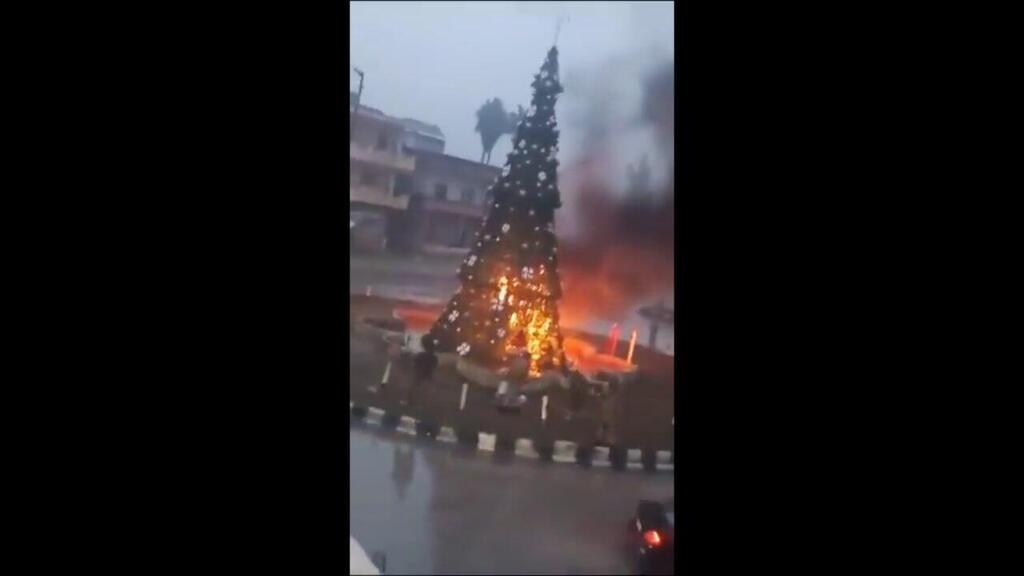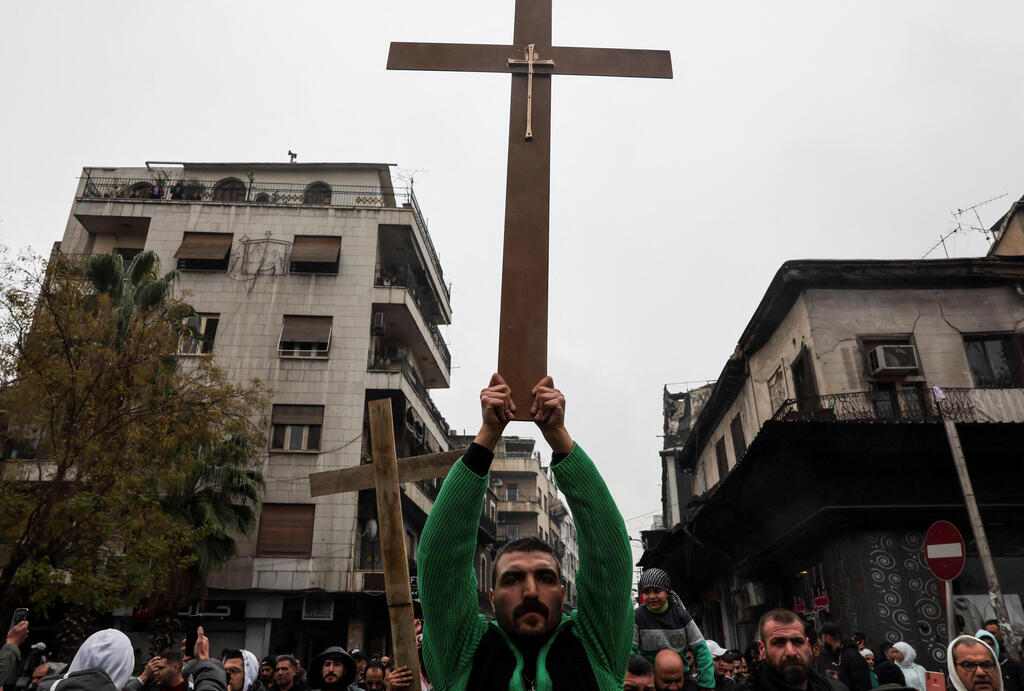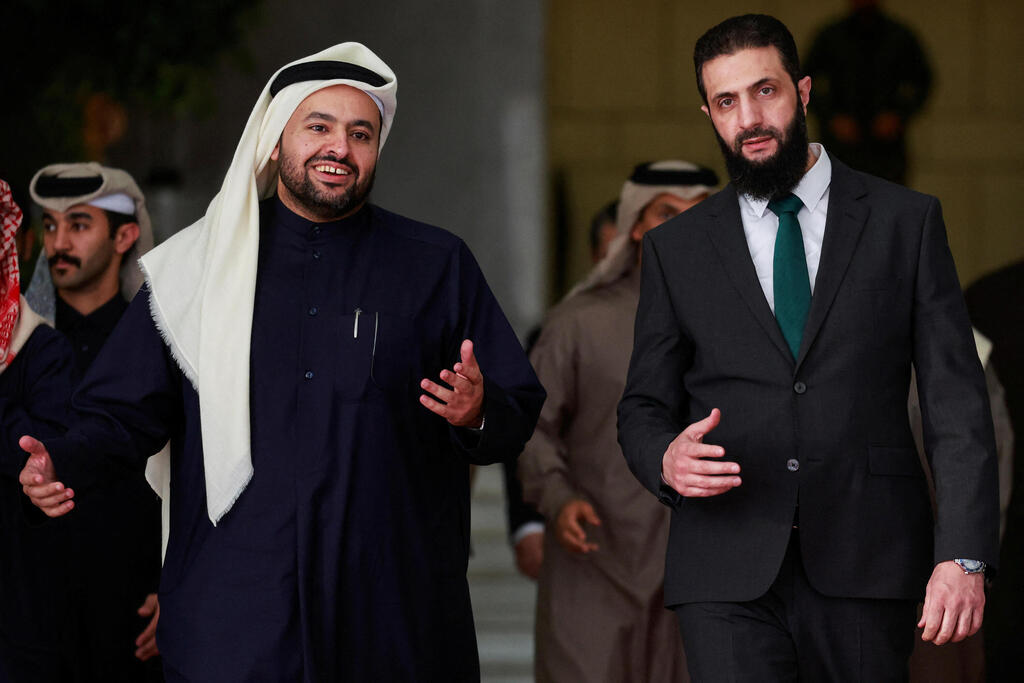Getting your Trinity Audio player ready...
In Syria, thousands of Christians took to the streets on Tuesday to protest the burning of a Christmas tree in a predominantly Christian town in the center of the country. The incident, reportedly carried out by foreign jihadist rebels, has intensified fears among Christians and other minorities about the new leadership under the jihadist rebel group Hay’at Tahrir al-Sham (HTS). Despite their attempts to project a moderate image and promises to safeguard all minorities, the attack has raised serious concerns about what the future holds under their rule.
Extremists set Christmas tree on fire
The attack, which enraged Syria's Christian minority—already significantly reduced during the country’s brutal civil war – took place in the town of al-Suqaylabiyah in Hama province, where the majority of residents are Christians. Video footage of the incident shows masked gunmen pouring flammable liquid on a large Christmas tree in the town square before setting it ablaze.
The culprits’ identities remain unclear. However, the new HTS-led government, under the leadership of Ahmad al-Sharaa, rushed to condemn the act, claiming it was carried out by non-Syrian fighters. Many foreign jihadists, who view their involvement in the Syrian conflict as fulfilling a religious duty, have joined the ranks of rebel groups, including HTS. Reports from Sky News Arabia suggested that the attackers were Chechens, while the Syrian Observatory for Human Rights identified them as Uzbeks affiliated with the jihadist group Ansar al-Tawhid.
According to the Observatory, the armed men threatened locals with their weapons, preventing them from approaching the tree. However, firefighters managed to extinguish the flames after the attackers fled. Some reports indicate the suspects were later arrested. The Observatory, which operates from London and is aligned with rebel groups, issued a statement accusing such incidents of undermining national stability and efforts toward peaceful coexistence among Syria’s diverse ethnic and religious communities.
Protests erupted immediately after the incident. In a viral video, a Muslim cleric representing HTS addressed local residents, claiming that the attackers “are not Syrians” and vowing they would face punishment. He promised the Christmas tree would be rebuilt and relit the following morning. However, these assurances have done little to calm Syria’s Christian community. Protests continued on Tuesday across several locations, including the capital Damascus, where demonstrators marched with large wooden crosses and waved the Free Syria flag, which the rebels adopted as their symbol after toppling Assad’s regime.
“Let us sacrifice our souls for the cross!” chanted protesters in Damascus’s Bab Touma neighborhood. “We demand rights for Christians!” One protester, identified as George, told AFP: “If we cannot live with our Christian faith in our own country as we’ve always done, then we no longer belong here.” He added that despite repeated promises to protect minorities, Christians continue to face “a great deal of injustice,” disguised as “isolated incidents.”
This incident comes at a particularly sensitive time for the new rebel government led by al-Sharaa, who has been working to present a more moderate image to the world. His goal is to have the severe sanctions imposed during Assad’s rule lifted. Al-Sharaa, who once had ties to al-Qaida, has spent years insisting that he has cut all connections to the organization and has moderated his views. His supporters point to the reported protection of Christians under HTS rule in Idlib province in recent years as evidence of his shift in leadership style. Idlib, the group’s stronghold, was the launching point for last month’s surprise offensive that quickly led to the collapse of the old regime.
While al-Sharaa’s promises have been met with skepticism in the West, they have also sparked some cautious optimism that Syria could be on a new path – perhaps even toward a democratic future. Although the U.S. and its allies have yet to remove HTS from their list of terrorist organizations, diplomatic relations with al-Sharaa’s government have been renewed. Notably, the U.S. also withdrew the $10 million bounty it once offered for al-Sharaa’s capture a decade ago.
Get the Ynetnews app on your smartphone: Google Play: https://bit.ly/4eJ37pE | Apple App Store: https://bit.ly/3ZL7iNv
As part of his efforts to create a stable new regime and prevent further internal clashes among rebel factions, al-Sharaa has pledged to disband all armed factions and merge them under the Ministry of Defense. On Tuesday, the new government announced that al-Sharaa and faction leaders had reached an agreement to implement this plan. Photos from the meeting show al-Sharaa alongside faction leaders, including Marhaf Abu Qasra, who previously served as the head of HTS’s military wing and was recently appointed as the head of the Ministry of Defense.
In practice, this consolidation means that al-Sharaa and his allies will retain military power in the so-called “new Syria.” While his government pushes for international recognition, incidents like the burning of the Christmas tree threaten to undermine his attempts to rebuild trust and stability in a deeply fractured nation.







